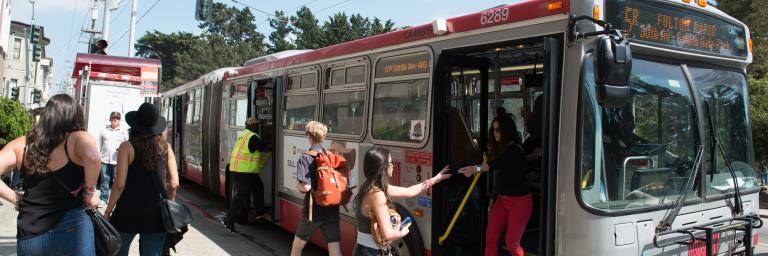We're celebrating 10 years of Muni Forward! Pick up a limited-edition Muni Forward Passport at a Transit Month event or participating business while supplies last during the month of September 2024. Use the passport to explore ten of Muni Forward’s project corridors, including the 5 Fulton.
The 5 Fulton transports locals and tourists on Fulton, McAllister and Market streets from the Financial District to the Great Highway and back, stopping at many important cultural destinations and civic institutions along the way — including Golden Gate Park and City Hall.
The SFMTA introduced “Rapid” service on the 5 Fulton as a pilot Muni Forward project, providing a limited-stop service in addition to local service on the 100-year-old route, so that riders could get across the city faster. “The Flying Fulton Pilot Project” kicked off in the summer of 2014.
Today, it is one of the most complete Muni Forward corridors, with transit priority improvements across the entire route, such as upgraded transit lanes, bus stop and corner bulb-outs, transit signal priority, and other upgrades that reduce travel time and increase safety.
- Current
Over the past 15 years, the 5 Fulton corridor has become one of the busiest in the entire Muni system. The SFMTA has been working hard to make the 5 Fulton even better through Muni Forward upgrades, including:
- Traffic calming measures: Installing traffic signals at key intersections and replacing stop signs with traffic circles.
- Consolidating some closely spaced stops.
- New transit infrastructure: Pedestrian bulbs and transit bulbs increase safety for people walking and make boarding more efficient. (To read more about transit and pedestrian bulbs, see our Pedestrian Improvements Toolkit blog post.)
- Transit lanes: Two miles of new or upgraded dedicated bus lanes along the 5 Fulton decrease travel times and make the 5R Fulton Rapid move more efficiently through the city.
- Installing a “contraflow lane” on McAllister near Market Street, which allows buses to take a more direct route.
- Implementing a “road diet,” which reduces travel lanes to calm traffic and improve safety while providing lanes that are wide enough for transit.
- Installing pedestrian bulbs and refuge islands to improve pedestrians safety.
